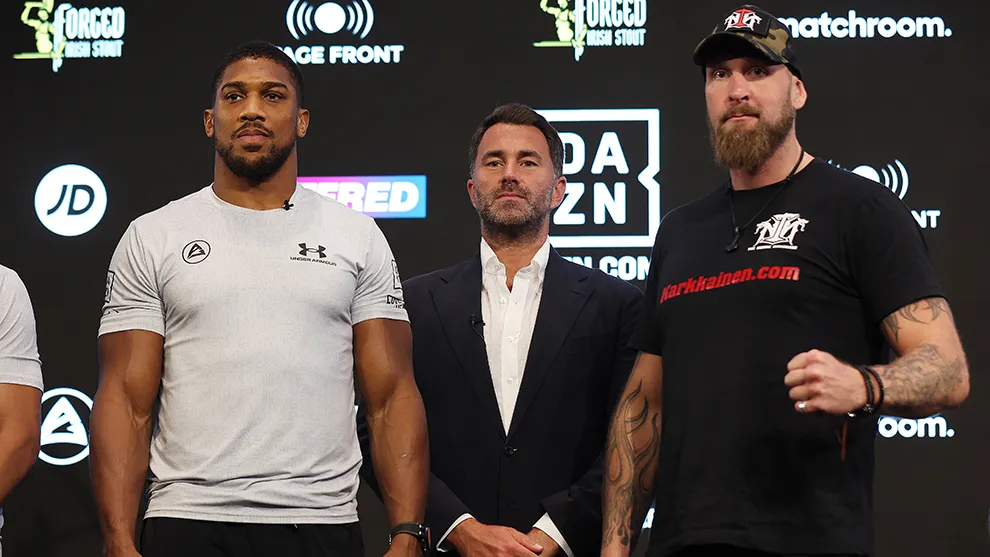IT WAS stated on last week’s Opening Bell podcast that the ongoing Conor Benn case should provide lessons aplenty to those who hold positions of power within boxing. On the morning of Saturday, August 5, three days after that episode was recorded, Matchroom Boxing announced that Dillian Whyte had tested positive for a banned substance following random VADA testing and his rematch with Anthony Joshua was therefore cancelled.
Though it’s never a good look for any sport when a high-profile athlete tests dirty, particularly when that athlete has tested dirty before, at least the right decision was made this time. Boxing News understands that upon hearing of Whyte’s failed test(s), thought to be in the very early hours of Saturday morning, Matchroom and broadcasters DAZN made the decision to pull the contest before Joshua was asked if he wanted to appear on the bill against a different opponent. After a long camp and keen to build some momentum ahead of a proposed showdown with Deontay Wilder, yes, he did. The British Boxing Board of Control’s Robert Smith, who found out via email at approximately 5.30am, was in complete agreement that the cancellation was not just the right decision, it was the only decision.
Very simply, the more boxers who get caught taking performance-enhancing drugs and are subsequently punished, the more effective the system will become. Furthermore, boxers getting caught and then punished is the only realistic deterrent to stop boxers trying their luck with such substances in the first place. So, yes, Whyte testing positive is bad. But the alternatives – like a boxer doesn’t get caught or, shudder, fails a test and is allowed to fight anyway – are far worse.
That doomsday scenario has happened before. Whyte defeated Oscar Rivas in July 2019 on a Matchroom bill after adverse findings were returned before the contest. An independent panel ruled on that occasion, much to the BBBofC’s frustration, that Whyte should be permitted to box and, five months later, UKAD withdrew their charges against the heavyweight. And it nearly happened last October when it emerged that Conor Benn had failed two VADA tests in the build-up to a proposed bout with Chris Eubank Jnr, only for the promoters – Matchroom and Wasserman – to move ahead with plans to stage the contest regardless. The aftermaths of both cases were ugly in the extreme.
Though Whyte has no ties to Matchroom, like Benn very much does, one could still reasonably surmise that lessons have been learned. Matchroom controlled the narrative this time – they told the media that Whyte had been caught with an illegal substance in his body, they indicated the fight was off, there was no effort whatsoever, BN understands, to stick around in the stink and find a way to stage the fight. Hands were instead quickly washed. That was the correct course of action when, in the past, it can be strongly argued the opposite occurred. What happens next, of course, is crucial.
Dillian Whyte (Richard Heathcote/Getty Images)
Whatever the reasons for Whyte failing what has been reported as multiple tests, a hefty punishment is now the only outcome that might persuade certain boxers not to cheat. Let’s not forget the test he failed in 2012, either. At best, Whyte is exceptionally careless when it comes to what goes into his body, and, in elite sport, there should be no place for such lack of attention.
Whyte, unsurprisingly, is claiming he is innocent. “I insisted on 24/7 VADA testing for this fight, as I have done voluntarily and at my own expense for all of my fights for many, many years,” he stated. “This is not the first time that I have been reported as having an adverse finding for a substance which I have not taken, and as I did last time I will again prove that I am completely innocent. In the meantime, all I can do is express my extreme disappointment to boxing fans, who will miss out on what was sure to be a great event.”
Joshua has been here before, of course. Back in 2019, a month or so before it was reported that Whyte had epimethandienone and hydroxymethandienone in his system, the then-multiple belt-holder was preparing for a New York showdown with Jarrell Miller, only for the American to fail multiple drug tests. In stepped Andy Ruiz at a few weeks’ notice and, well, you know the rest. Therefore, it should be no surprise that an opponent like Robert Helenius has been selected as Whyte’s replacement, more so when one considers the fight is only days away and that date with Wilder is supposedly all but signed.
Far from perfect and a bout that could be deemed a mismatch given Helenius’ most recent taste of world class heavyweight action ended inside three minutes when Wilder knocked him silly last year, if viewed solely as a vehicle for Joshua’s comeback that will not be on pay-per-view, it’s easier to understand.
One suspects there will be plenty who choose to criticise Joshua-Helenius as a matchup. There will be emojis depicting a face that is so amused it is literally crying with laughter attached to tweets. That’s all understood, too. But it could have been worse. It could have been Derek Chisora. It could have been Gerald Washington (and before the same people who are currently rolling around on their backs giggling their little heads off point out that Washington beat Helenius in 2019, that version of Washington, now shot to pieces, is long gone).
It could have been Dillian Whyte.
